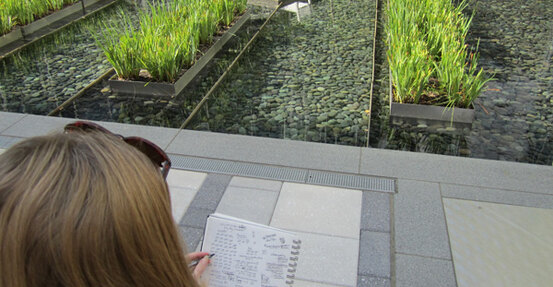
Keeping Promises: Exploring the Role of Post-Occupancy Evaluation in Landscape Architecture
How well do constructed landscapes live up to the lofty goals established by design professionals? And how do we know? University of Oregon graduate student (and former CSI research assistant) Andrew Louw is investigating this topic for his masters thesis. He is both trying to understand the role of post-occupancy evaluation (POE) within the landscape architecture profession and exploring the use of a digital data collection method for POEs.
Though environmental, social, and economic performance goals are often identified during the pre-design and design stages of a project, most projects lack effective post-construction monitoring and observation to determine if, and how well, the project’s design goals are being met. The Landscape Architecture Foundation’s Case Study Investigation (CSI) program was born out of a need to encourage and support design firms in assessing performance and documenting the benefits of sustainable landscape projects. CSI is entering its fifth year, and leading firms are increasingly investing in in-house research. Yet little is known about the use of and perceptions towards post-occupancy evaluation within the profession as a whole.
Louw’s preliminary findings reveal that while practitioners believe POE is beneficial and helps legitimize the profession, fewer than half of landscape professional report having experience using POE. This suggests that POE remains on the sidelines and is not yet an integral part of practice.
Landscape architects who reported having experience with post-occupancy evaluation (POE) strongly agreed that it informs their future design process.
The landscape architects who do use POE are using it to guide future work, enhance landscape performance, provide expert testimony, market their skills, produce research, and inform the education of the next generation of professionals. Initial findings indicate that using POE changes the way we work: respondents who reported having experience working with POE strongly agreed that the experience informs their future design process.
To increase the validity of the data, Louw is seeking more respondents. Landscape architecture practitioners and others interested in landscape performance are invited to participate in Louw’s study by taking the following survey:
https://oregon.qualtrics.com/SE/?SID=SV_e2kIQPRAJLWftxX
